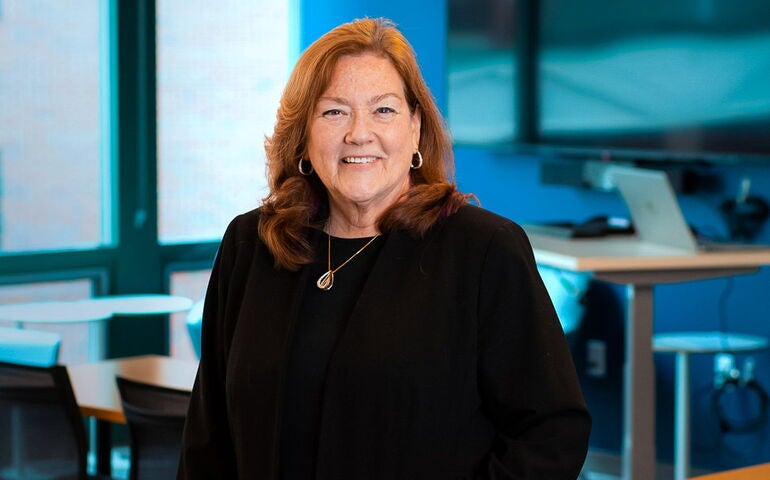On the Record: Maine Law enrollment ‘steady and growing,’ dean says, Fort Kent clinic thriving
 File Photo / Tim Greenway
Leigh Saufley, dean of the University of Maine School of Law, was honored by Mainebiz as a Business Leader of the Year in 2023.
File Photo / Tim Greenway
Leigh Saufley, dean of the University of Maine School of Law, was honored by Mainebiz as a Business Leader of the Year in 2023.
A year after Leigh Saufley was recognized by Mainebiz as a Business Leader of the Year, we sat down with the dean of the University of Maine School of Law for an update on enrollment, this year’s graduating class and the school’s Rural Practice Clinic in Fort Kent that opened in early 2023.
Mainebiz: How is enrollment at Maine Law?
Leigh Saufley: Enrollment at Maine Law has been steady for the last two or three years. The issue for Maine Law on enrollment is actually enrolling students who have excellent credentials so they will pass the bar — so we’re always looking at those two things, but it’s steady and growing.
MB: Last year you mentioned recruiting students from out of state. How is that going?
LS: It’s going great. Last year, at least 40% of the [incoming] students were from out of state. And in our last graduating class, 80% of the students stayed in Maine, so we are relatively confident that we are drawing talent into Maine that’s staying here, which is really exciting.
MB: Where are they coming from?
LS: They’re coming from everywhere. We have a lot of students from New England of course, and then we have students from Texas, from further down on the East Coast — we have a lot of students from Florida. They come from everywhere in the country, and occasionally we get someone who has been studying out of the country and arrives back here and says, ‘Maine is the place I want to be.’
MB: And this year’s graduating class?
LS: The graduating class is a class of amazing students. They are going all over the world. We’ve got several students who went to the [UN Climate Change Conference] in Dubai. We also had students going to Washington, D.C., for moot court and earlier this week, two of our students argued a case before to the Supreme Judicial Court of Maine.
So, our students are doing amazing work — they are doing externships, they’re part of the clinic, they are out there with their professors representing people. It’s a pretty wonderful group of students right now.
MB: How are things going with the rural practice clinic in Fort Kent?
LS: Very well. Maine’s attorney general, who stepped up at the request of the Senate president last year, has now found the dollars to help us keep the rural justice clinic open for two more years, so we are now solidly funded through a five-year trial. The students are doing remarkable work, representing people who almost certainly would never have had representation.
MB: What opportunities do virtual law firms pose for your graduates?
LS: We’re seeing a number of our attorneys leaving Maine Law, graduating, passing the bar and working for firms that are across the country, but able to have the Maine way of life. It’s a very inviting way to practice law. Talking with the students who are doing it, it has lots of benefits, because you can dive right into your area of law and now have to leave this beautiful state.
But it also has some drawbacks, [like not being able to] sit in a room with your client. We’re all learning what’s the balance and how will we get there.
MB: Finally, how closely do you pay attention to school rankings?
LS: Rankings are important to students, which means they have to be important to us. The problem with rankings right now is that they’re in constant flux, so for law school leadership across the country, there is a lot of concern that rankings don’t express what they should.
So, we pay attention to them, and we hope for good rankings, but for Maine Law, what we want is to build the community and for our students to pass the bar and get great jobs.
I really think Maine Law is going to be at the very top of the state law schools very soon. We are working to build a good, ethical legal culture and a culture of pro bono from students, and we want to build really resilient, smart ethical people who get great jobs and make the world a better place.












0 Comments